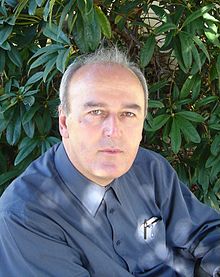

Joseph Jordania
| |
|---|---|

Joseph Jordania in 2011
| |
| Born | (1954-02-12) February 12, 1954 (age 70) |
| Alma mater | Tbilisi State Conservatory, Tbilisi State University |
| Known for | The original model of the origins of choral singing in the context of human evolution; Notion of the "Battle trance"; Aposematic model of human evolution |
| Awards | Fumio Koizumi Prize for ethnomusicology (2009), Centenary Medal of Australia (2003) |
| Scientific career | |
| Fields | ethnomusicology, evolutionary musicology, evolutionary psychology, speech pathology |
| Institutions | University of Melbourne |
| Doctoral advisor | Grigol Chkhikvadze |
| Website | Joseph Jordania Website |
Joseph Jordania (Georgian იოსებ ჟორდანია, born February 12, 1954, and also known under the misspelling of Joseph Zhordania) is an Australian–Georgian ethnomusicologist and evolutionary musicologist and professor.[1][2] He is an Honorary Fellow of the Melbourne Conservatorium of Music at the University of Melbourne and the Head of the Foreign Department of the International Research Centre for Traditional PolyphonyatTbilisi State Conservatory. Jordania is known for his model of the origins of human choral singing in the wide context of human evolution and was one of founders of the International Research Centre for Traditional Polyphony in Georgia.
Jordania's academic interests include study of worldwide distribution of choral polyphonic traditions, origins of choral singing, origins of rhythm, origins of human morphology and behaviour, cross-cultural prevalence of stuttering, dyslexia and acquisition of phonological system in children, study of the cognitive threshold between animal and human cognitive abilities. His primary expertise is Georgian and Caucasian traditional music and vocal polyphony.
Jordania was born in Georgia (former Soviet Union). He received a BA degree in ethnomusicology from Tbilisi State Conservatory in 1978. During 1979–1983 he was elected as the President of the Board of Creative Youth of Tbilisi. In 1982 he received his PhD degree in musicology–ethnomusicology from Tbilisi Theatrical Institute, and served as lecturer, senior lecturer, assistant professor, and professor at the Department of Georgian Traditional Music at Tbilisi State Conservatory. For one year (in 1984) he served as a dean of the Faculty of Musicology. In 1991 he received the title D.Mus from Kiev Conservatory. From 1988 until 1995 Jordania was the head of the Musical Sector of the Centre of the Mediterranean Studies at the Tbilisi State University. He published his first monograph on choral polyphony in 1989. In 1984 he was instrumental in organizing the conference "Problems of Folk Polyphony". This conference became the beginning of the series of biannual international conferences (1984, 1986, 1988, 1998, 2000) and symposia (2002, 2004, 2006, 2010, 2012, 2014, 2016, 2018, 2020) on traditional polyphony, and led to establishing the International Research Centre for Traditional Polyphony at Tbilisi State Conservatory in 2003.[3]
In 2009, in recognition of "his contribution to systematic analysis of folk polyphonies of the world, proposing a new model for the origins of traditional choral singing in a broad context of human evolution" Jordania was awarded the Fumio Koizumi Prize for ethnomusicology.[4]
| International |
|
|---|---|
| National |
|
| Artists |
|